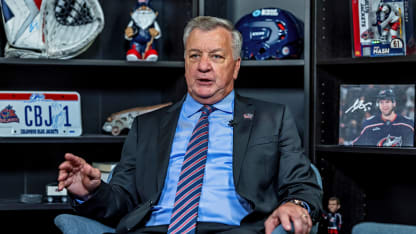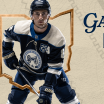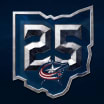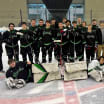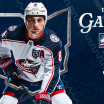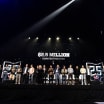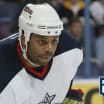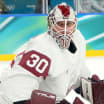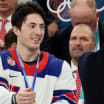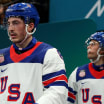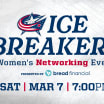Don Waddell has taken over as the fourth general manager in Blue Jackets history, in addition to being the team's president of hockey operations, signaling a new era for the CBJ hockey.
A hockey lifer, Waddell has been just about everywhere and done just about everything in the game. The defenseman played one NHL game and spent the rest of his playing career in the minors -- including a two-year stint with Toledo of the IHL in the mid-1980s -- then moved to the management side.
He's worked as a minor league general manager in multiple cities, an assistant GM in Detroit, the general manager and president for the expansion team in Atlanta, a scout for Pittsburgh and finally serving as president of business operations and eventually general manager of the Carolina Hurricanes.
It's a lengthy resume, and it's all led Waddell to Columbus after six successful seasons with the Canes. To allow fans to get to know Waddell, BlueJackets.com sat down with the new CBJ front office leader to discuss his path to the capital city, what's stood out about his career and much more.
As Ohioans, we love to talk about Ohio, so I wanted to start there. With your time in Toledo and having been around the Midwest, being from Detroit, I’m sure you’ve spent some time here. What’s it like for you to come back to the Midwest, and what do you know about this state and this community?
Waddell: “I know quite a bit. I have a niece that lives here in Dublin, and I’ve been through Columbus quite a bit and have been here as a visitor. In 2004 the U.S. team, we had our World Cup training camp here in Columbus and I was part of that staff. Never lived here, but spent time here and always found Ohioans to be great people, and obviously they love their Blue Jackets here.”
What was your experience in Toledo like all those years ago?
“It was great. It was the best fanbase as a player I could play in, and the worst I could go in as a visitor. They were very dedicated and they’re very rowdy and loud, and it was a fun place to play – for the home team, not as a visitor. Now it’s a much nicer arena than when I played.”
You’re part of the small group of people that have played just one NHL game. What do you remember about that game?
“They scored on my first shift. I was playing with LA in 1981 and I was teammates with Jerry Korab. We’re playing the New York Rangers, and first period, Ron Greschner was playing left wing at the time. He came down on me – I was the right defenseman – and before I know it, it’s a one-on-one. Jerry Korab came over, threw this big hip check. He missed Greschner, hit me, and I was laying on the ice when (Greschner) went in and top-shelfed it on Mario Lessard. It was my first game, so I remember it very well.”
A real welcome to the NHL moment.
“Yeah. We ended up losing 6-2, but that was the only goal I was on for against. It was a great experience.”
I read that a few years ago, you got your jersey from that game back.
“I got the jersey back and I got the main scoresheet back. It’s very, very cool, especially when you only play one game. I kept the scoresheet and carried it around for years and got players from both teams to sign it. It’s been a nice little collector’s item for me.”
I read you went to Northern Michigan University and were a business major of some ilk. You’ve done so much on the business side, whether it be for NHL teams or even teams outside of hockey. How did you get into that side of the sports world?
“When I was finishing my career in the IHL there, I knew I wanted to get into management. I wasn’t sure I wanted to get into coaching, but I wanted to get into management. I was 27 or 28 years old, and I had 95 points as a defenseman (with Saginaw), but I just felt like if I keep going the way I’m going, I’d need separation from the game. So I got out of the business, or I thought. I started my own business, and six or seven months into my retirement, I get a call and (Flint) offered me an assistant coaching job to play for the rest of the year. The following year I got offered the GM job to take over the team. That’s how I ended up in management, then I went from Flint to San Diego and all over from there.”
You’ve done it all, whether it be as a player, coach or management, and you’ve also seen it all on the business side as well. You’ve also been in the IHL, the NHL, all different places. Do those experiences add up to the sum of who you are?
“First of all, I love the business side of our sport because it gets overlooked a lot. If you want to be a successful organization on the business side and on the ice, one can’t do it without the other. As a GM, we need as much money as we can to sign players and spend on players, but the only way we’re going to do that is if we give them the product on the ice so they can sell sponsorships, sell season tickets. It goes hand in hand with each other. I love the business side, but I made a decision years ago that I was going to jump back on the hockey side and I ran with it from there.”
Do you have a guiding thought or philosophy – it could be anything, but as you approach your day to day, is there a certain mantra you hold dear that you try to stick to?
“First thing is I’ve never had a bad day of work. A bad day is if something happens to your family and that. I have good days and hard days (at work). So when my feet hit the floor every morning, it’s a good day, and I’m gonna make the best out of it. I’m a positive thinker. No job is too small for me to help somebody do. We have to be in this thing together. You are gonna hear me say that so many times. If we’re not all in this thing together, we’ll never be a successful franchise. I want people to work hard, I want people that are honest, and if we make a mistake, let’s admit it and move on. You try to cover up a mistake, it becomes a big problem. We’re all gonna make mistakes; sometimes we just don’t want to admit we made the mistake. You know what? Admit the mistake. We can fix it and move on.”
I have one actual hockey question for you. Down in Carolina, the team has been known for a certain style of play, the really aggressive forecheck you’ve been able to play. You’re coming in here into a situation where you have a good young team that’s similar to what you had in Carolina. Is that something you can replicate or even want to replicate, or are you going to have to see what you have here?
“I think you have to look at your personnel. The one thing we had, everybody could skate. We had a great skating team that could play that system. Any system, you can’t play that system if you don’t have the horses to play that system. You have to make sure you know what your personnel is like. So the man-on-man that we played in Carolina, or if you’re gonna play a 1-3-1 or 2-3, whatever, that’s more gonna be set up by the personnel you have on your hockey team.”
Did you enjoy putting together a team that plays that style?
"I loved it. We spent more time in the offensive zone, the more time you spend in the offensive zone, you're probably gonna score more goals than the other team most of the time.”
I told (intern) Kennedy (Rehklau) I’d put her on the spot and make her ask one.
Rehklau: We talked about how you’ve served in many different roles throughout your time in hockey. Among all those roles, what has been your most prized memory in the sport of hockey?
“I was fortunate when I was with the Red Wings, I was the assistant GM and we won the Stanley Cup. But honestly, getting the job in Atlanta, getting hired by Ted Turner to start that franchise was a big honor to be recognized and do that and then pull it off. I thought it was great. No. 1 is winning – anytime you win, you’re excited and you can’t replace that – but being able to start my own franchise at the NHL level was pretty exciting too.”

